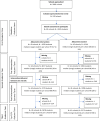Effectiveness and cost-effectiveness of universal school-based mindfulness training compared with normal school provision in reducing risk of mental health problems and promoting well-being in adolescence: the MYRIAD cluster randomised controlled trial
- PMID: 35820992
- PMCID: PMC9340028
- DOI: 10.1136/ebmental-2021-300396
Effectiveness and cost-effectiveness of universal school-based mindfulness training compared with normal school provision in reducing risk of mental health problems and promoting well-being in adolescence: the MYRIAD cluster randomised controlled trial
Abstract
Background: Systematic reviews suggest school-based mindfulness training (SBMT) shows promise in promoting student mental health.
Objective: The My Resilience in Adolescence (MYRIAD) Trial evaluated the effectiveness and cost-effectiveness of SBMT compared with teaching-as-usual (TAU).
Methods: MYRIAD was a parallel group, cluster-randomised controlled trial. Eighty-five eligible schools consented and were randomised 1:1 to TAU (43 schools, 4232 students) or SBMT (42 schools, 4144 students), stratified by school size, quality, type, deprivation and region. Schools and students (mean (SD); age range=12.2 (0.6); 11-14 years) were broadly UK population-representative. Forty-three schools (n=3678 pupils; 86.9%) delivering SBMT, and 41 schools (n=3572; 86.2%) delivering TAU, provided primary end-point data. SBMT comprised 10 lessons of psychoeducation and mindfulness practices. TAU comprised standard social-emotional teaching. Participant-level risk for depression, social-emotional-behavioural functioning and well-being at 1 year follow-up were the co-primary outcomes. Secondary and economic outcomes were included.
Findings: Analysis of 84 schools (n=8376 participants) found no evidence that SBMT was superior to TAU at 1 year. Standardised mean differences (intervention minus control) were: 0.005 (95% CI -0.05 to 0.06) for risk for depression; 0.02 (-0.02 to 0.07) for social-emotional-behavioural functioning; and 0.02 (-0.03 to 0.07) for well-being. SBMT had a high probability of cost-effectiveness (83%) at a willingness-to-pay threshold of £20 000 per quality-adjusted life year. No intervention-related adverse events were observed.
Conclusions: Findings do not support the superiority of SBMT over TAU in promoting mental health in adolescence.
Clinical implications: There is need to ask what works, for whom and how, as well as considering key contextual and implementation factors.
Trial registration: Current controlled trials ISRCTN86619085. This research was funded by the Wellcome Trust (WT104908/Z/14/Z and WT107496/Z/15/Z).
Keywords: Child & adolescent psychiatry; Depression & mood disorders.
© Author(s) (or their employer(s)) 2022. Re-use permitted under CC BY. Published by BMJ.
Conflict of interest statement
Competing interests: WK is the Director of the Oxford Mindfulness Centre and receives royalties for several books on mindfulness. JMGW is former Director of the Oxford Mindfulness Centre and receives royalties for several books on mindfulness.
Figures


References
-
- Health statistics and information systems: Disease burden [Internet]. World Health Organization, 2011. Available: http://www.who.int/healthinfo/global_burden_disease/estimates_regional/e... [Accessed 23 Feb 2013].
-
- Greenberg MT, Abenavoli R. Universal interventions: fully exploring their impacts and potential to produce population-level impacts. J Res Educ Eff 2017;10:40–67. 10.1080/19345747.2016.1246632 - DOI
Grants and funding
LinkOut - more resources
Full Text Sources
